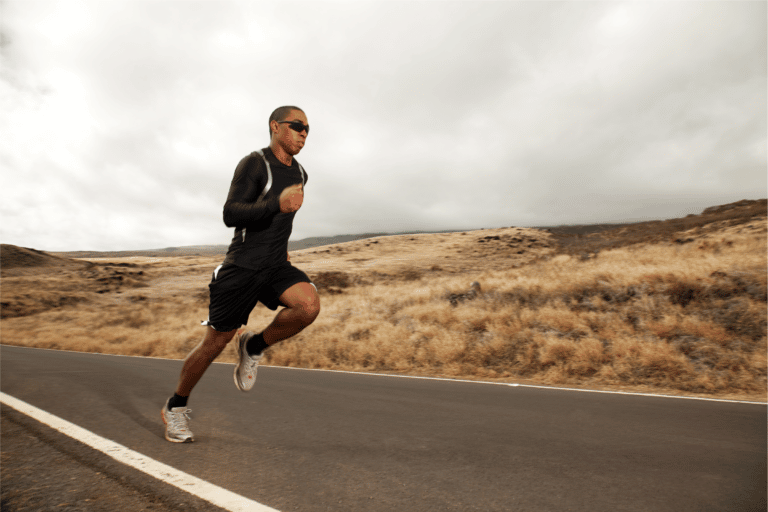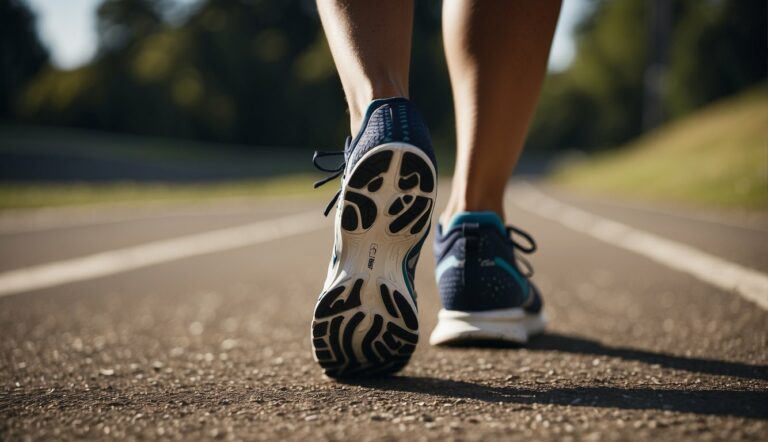Should You Run Right After Waking Up? (5 Pros, 5 Cons)
If you’re the type of person who likes to run before the day starts, the question of whether to run before or after eating has probably come up. While everyone has a different routine, you may be wondering if there are certain benefits to running immediately upon waking up, or if waiting until you have eaten and digested your breakfast provides an advantage.
Let’s take a deeper look at the question, “Should you run right after waking up?”
You can run right after waking up if you consider yourself a morning person and don’t use running as a primary weight-loss strategy. This is because running before eating produces a lower metabolic rate than the alternative. Despite this, running can be a great way to start your day, producing endorphins that boost mood and energy levels.
Continue below to compare the benefits of running right after waking up to alternative options.
Is it OK to exercise as soon as you wake up?
For some people, exercising immediately after waking up can be a great habit to build. A morning run through the park and other forms of light cardio can be a wonderful way to start the day.
Aerobic exercises, such as early morning runs, are great for producing endorphins that have been linked to positive effects on mood and possibly even neuroplasticity. Apart from this and the obvious cardiovascular health benefits, running in the morning can be a great way to seize the day and build discipline into your life.
Furthermore, for people confined to office work and desk jobs, taking a stroll or jogging through nature can have a real grounding effect psychologically and emotionally.
With that being said, some potential drawbacks are also involved with running immediately upon waking up. It’s important to run through the following checklist to ensure that none of the following items apply to your situation.
You might consider running later in the day if:
- You suffer from chronic joint pain or arthritis
- You are using running as a primary weight-loss strategy
- You typically get your best sleep in the early morning hours
- You live in an extremely cold climate and experience more conducive temperatures in the afternoon
- You already find your morning schedule to be too hectic
How long after I wake up should I wait to run?
Depending on individual preference, a person can run as soon after waking as they like. For some people, rolling out of bed and lacing up their running shoes is the best method for getting their feet to the pavement.
If you find yourself easily distracted by the television, the breakfast table, the newspaper, or any number of potential distractions, running immediately after waking up might be the right strategy for you.
No specific time of day is considered better for running than others. It really depends on a person’s specific running goals and how much outside factors affect their ability to maintain their running habit to reach said goals.
If you find that running right after waking up works for you, then, by all means, continue!
Reasons to run right after waking up?
There might be many reasons for a person to choose to run immediately upon waking. Below is a list of some of these reasons and the associated benefits that you may experience with each one.
- Boost In Mood
- Convenient Timing
- Cooler Weather
- No Sluggishness From Overeating
- Improved Sleep Architecture
Boost In Mood
As stated above, running first thing in the morning can produce endorphins that create a boost in the mood at the outset of your day.
Do you ever find yourself mosying into work with a sour and disillusioned attitude? Try running first thing in the morning. After a few weeks of this habit, the evidence suggests it is highly likely that you will experience a positive mood change.
In addition to the endorphins it provides, running in the morning may also help improve sleep for those that already feel energized in the mornings.
Convenient Timing
Another key benefit to running immediately upon waking is the convenience of timing that it offers extremely busy people.
If you can’t find another minute to squeeze into your day, you may want to try running first thing in the morning. Chances are, you currently don’t utilize your early mornings as efficiently as you utilize the rest of your days.
It’s possible that you have a 30-minute window hiding in your current morning routine that would be better utilized for exercise.
Cooler Weather
In warmer climates, running in the morning is a must. And typically, for these climates, the earlier you run, the better off you will be.
Running before the sun is a surefire way to ensure you get your run in during the coolest part of the day. If you find yourself constantly overheating on your runs, try transitioning to running right after you wake up.
No Sluggishness From Overeating
Although there can be some drawbacks to running on an empty stomach, running right after waking up guarantees that you won’t suffer from the sluggishness that occurs when running after overeating or after not allowing a proper amount of digestion time.
Most of the time, your body will already be at or near a state of ketosis after sleep. Thus, your body will be fueling itself on reserves of fat and carbohydrates and you won’t need to feed it anything before your run to have energy.
Improved Sleep Architecture
Exercising in the morning has been shown to improve a person’s overall sleep patterns. As a person approaches middle age, they will likely see a reduction in the amount of deep sleep they can achieve. However, early morning aerobic exercise, such as running, seems to promote the types of hormones the body needs to sleep more deeply.
Reasons not to run right after waking up
In contrast to the reasons listed above, there are several reasons not to run right after waking up as well. The list below will cover these reasons and their negative consequences.
- Increased Risk Of Injury
- Feeling Lightheaded
- Poor Metabolic Rate
- Cold Climate
- Hectic Morning Schedule
Increased Risk Of Injury
Running right after waking up may provide an increased risk of injury. Overnight, your body may become stiff from lack of motion. This is because of changes in the lubrication in your joints and fascia that occurs when your body is at rest for long periods of time.
Like a car without lubricant, your body may have a hard time completing your run before it is properly warmed up. Attempting to do so without a proper warmup may increase your risk of injury in the joints or muscle tissue.
Feeling Lightheaded
If you decide to postpone breakfast until after your early morning run, you might end up with some negative side effects.
At night, your body continues to burn calories, which can sometimes cause it to enter into a state of ketosis by the morning. If you wake up and immediately start exercising, your body may begin to pull from different energy reserves. This can cause lightheadedness or dizziness.
Poor Metabolic Rate
There is some evidence to suggest that running before breaking a long fast (such as an overnight fast) contributes to a poor metabolic rate.
If this is true, then running immediately upon waking up is not the most optimal time to perform exercise if you have the goal of losing weight. One study, however, has found that fasted and non-fasted participants burned calories at around the same rate, so this question is still very much up in the air.
Cold Climate
Running right after waking up may not be the smartest idea if you live in a cold climate. Obviously, temperatures are often lowest before the sun comes up. For those who battle with winter elements waiting until later in the day, when the sun is out, may be beneficial.
Warmer weather can also help loosen up joints and muscles, decreasing the risk of injury.
Hectic Morning Schedule
Finally, if you already have a hectic morning schedule, don’t try to force in a run for its own sake. There’s nothing inherently better about running in the morning versus other time slots throughout the day.
Running in the morning is mostly a matter of preference, with a few auxiliary pros and cons. If running in the morning just won’t fit into your schedule, you simply need to pick a later time.
Is it good to run on an empty stomach in the morning?
If you plan to run first thing in the morning, the question of when to eat breakfast probably comes to the forefront of your mind.
For some people, eating before running may cause sluggishness or indigestion. This is most likely due to poor portion sizing or insufficient time allowed for digestion, however.
In general, it’s a good idea to eat something light and rich in carbohydrates an hour or two before running. Perhaps something made from whole grains, fruits such as a banana or an apple, or yogurt with granola.
Running on an empty stomach may be fine if you plan on taking a light jog, but for serious runners, choosing to forgo breakfast can lead to several negative symptoms. Lightheadedness and extreme fatigue may beset runners who decide not to fuel their bodies before pushing them to extreme performance levels.
Tips for running right after you wake up
If you plan to run right after waking up, follow the following procedures to ensure that your experience is good. The list is composed of tasks to complete the night before a run, tasks to be done right after waking up, and post-run tips as well.
Here are some helpful tips:
- Drink 16 ounces of water before bed
- Get 7-8 hours of sleep
- Eat something light and rich in carbohydrates
- Drink 8 ounces of water
- Stretch and Warmup
- Cooldown
Drink 16 Oz of Water Before Bed
It is recommended that you drink 16 oz of water every 2-3 hours leading up to a run up until 2 hours before a run. If running first thing in the morning, obviously you will not be able to meet this hydration requirement, as you will be asleep. However, 16 oz right before bed will still help your body stay hydrated.
Get 7-8 Hours of Sleep
It is recommended that adults receive at least 7 hours of sleep per night. This is especially true for adults planning to partake in intense aerobic exercise first thing in the morning. For better performance and an improved overall experience, make sure you get the proper amount of sleep.
Eat Something Light and Rich in Carbohydrates
For a pre-run snack, you might want to try consuming something light and rich in carbohydrates such as a banana, a cup of dry cereal, or 10-15 crackers. Consuming anything heavier than than in the half hour leading up to your run will lead to sluggishness and discomfort. Your should settle on something light and energy rich like the foods mentioned above instead.
Drink 8 oz of Water
About 15 minutes prior to beginning your run, it is recommended that you drink 6-8 oz of water to aid with hydration. Running first in the morning means you won’t be able to properly hydrate in the hours leading up to your run. Instead, 16 oz before bed and 6-8 oz right before taking off can help to bridge the gap.
Stretch and Warmup
Before attempting to participate in any aerobic exercise, stretching and completing a light warmup would be wise.
A few moments of static stretching of important muscles such as the hamstrings, quadriceps, and hip flexors will, paired with a couple of dynamic warm-up movements like power skips or high knees, will get the job done.
Cool Down
After your run, make sure you allow your body the proper amount of time to cool down. After moderate-intensity runs, it can take the body 15-30 minutes to cool down all the way completely.
After you finish, make sure to walk for 5-10 minutes at least, then perform some form of static stretching to complete the process. The key is to get your heart rate to lower before becoming completely sedentary.






